There were some concerns over the health of Tim Stutzle's knee after suffering an injury playing for Germany at the World Championships. We got some clarification from Ottawa GM Pierre Dorion and it seems good news:
Re-injuring the same knee isn't great, but that the recovery won't take long, plus having the entire offseason to train, is about as good as it could get for Stutzle and the Sens.
*
At the other end of the knee injury spectrum:
That kind of timeline for Wilson would, at the earliest, see him miss a month of action, if not right into 2023. It all depends how he rehabs and heals, but he’ll miss a good chunk of the regular season regardless.
*
Sometimes, a player will just impose their will on a game and take it over. We have seen it more than once from Connor McDavid this postseason alone. Nathan MacKinnon had been goalless in the series against St. Louis, but Colorado's superstar ended that streak quickly in Game 5. His first two goals of the series, both in the first period, gave the Avalanche a 2-0 lead in a potential Game 5 clincher. Things would stand at 3-1 heading into the third, where the Blues made things interesting.
Robert Thomas scored halfway through the final frame and Justin Faulk slammed home the game-tying tally with about five minutes left in regulation. That seemed to put the game on a path for our second overtime in this series, until MacKinnon finished the hat trick in absolute style:
Colorado wouldn't hold on to that lead though as a late goal from Thomas sent us to our second overtime of the series.
Tyler Bozak was the overtime hero with a shot from the blue line finding the back of the net, forcing a Game 6 set for Friday night. The Blues erased a three-goal deficit and a late-game one goal difference to extend the series in what was one of the most exciting games of these playoffs.
*
The Florida Panthers were unceremoniously dumped out of the second round of the postseason thanks to a sweep from their state-mates in the Tampa Bay Lightning. Being taken out in four games as a top seed is generally a surprise anytime, but that they scored just three goals in four games speaks to how lopsided the score was. Of course, whenever something like this happens, we, as fantasy players, try to look for logic in what happened. Is there anything we can learn for next season, and what that 2022-23 Panthers roster might look like? Let's take a dive.
What sticks out immediately about the four-game loss is that, on the flipside of scoring just three goals, Andrei Vasilevskiy allowed just three goals. He had a 49-save shutout in the clincher, allowed no more than one goal in the three previous games, and posted a .981 save percentage. We just saw with Dallas that elite goaltending for a series is no guarantee of a win, but allowing just one goal roughly every 50 shots is just super-human goaltending.
It wasn't as if they were just firing shots from everywhere, either. Through the first four games of each of the four second-round matchups, Florida was second by expected goals at 5-on-5 (behind on Calgary) and first in expected goals at 5-on-4. Tampa Bay generated more overall, but it wasn't an extreme discrepancy (3.9 per 60 minutes against 3.5 for Florida). The difference was shooting percentage, with the Lightning shooting 10.3% against Florida finishing just under 2%. Had Florida shot 10%, they would have scored five times as many goals. Such is the NHL playoffs.
The thing is, we don't have to go very far back for an elite team to get goalie'd in the playoffs. Does anyone remember this very Tampa Bay team getting bounced in four straight by the… *checks notes*… Columbus Blue Jackets? It wasn't nearly as extreme, but the Lightning shot 6.8% against a whopping 17.6% from the Blue Jackets, and it gave us a one-week series. Things have turned out just fine for Tampa Bay since.
That is kind of the point of all this. I watched three of the four games and yes, of course there were some mistakes that Florida made at key points that could be pointed to as the reason for a given loss. The larger point is that had Vasilevskiy not turned in one of the top single-series goaltending performances of the last decade, those mental lapses may not have even mattered. That is the nature of a week or two of hockey.
To bring it to fantasy, it makes me wonder what the general public will see as the true upside of this roster next year. There are a couple key UFAs – and we'll get to them – but much of this roster should be back. When I looked at a couple other sites for 2019-20 fantasy hockey rankings (Rotoballer and Sporting News), most people were still high on the Nikita Kucherov/Steven Stamkos/Andrei Vasilevskiy tier. But for guys that were further down the lineup that still had good seasons (Yanni Gourde, the then-traded J.T. Miller, the 46-point Ryan McDonagh) they were either just inside the top-200 or much later. Fantasy owners will still target the elite guys with a track record of success – in Florida's case, Aleksander Barkov, Jonathan Huberdeau, Aaron Ekblad – but it's a wonder where guys like Anton Lundell, Carter Verhaeghe, Anthony Duclair, or MacKenzie Weegar end up. Maybe they don't wind up as expensive at the draft table as they would have been with a Cup run. Something to monitor when September rolls around.
Then there's the issue of what, exactly, this team will look like. According to Cap Friendly, they have under $4M in cap space for next season and at least four regulars are unrestricted free agents: Claude Giroux, Mason Marchment, Noel Acciari, and Ben Chiarot. With a little finagling, maybe they can squeeze in both Acciari and Marchment, for example, but all four won't be returning. Losing Chiarot won't hurt, but Giroux had 23 points in 18 games after the trade from Philadelphia. The team was deep enough that he was playing all over the top-9, and if he walks, replacing that won't be easy.
It will be easier to do that if Marchment returns. It can't really be understated just how good his season was. He had 47 points in 54 games with just 2 of those 47 points coming with the man advantage. He led Florida in both goals and assists per 60 minutes at 5-on-5 (from Natural Stat Trick), one testament to his strong season. His 13.5% shooting at 5-on-5 might seem high, but he also led the team in high-danger shot attempts, so he was generating a lot of quality chances. And that 13.5% shooting wasn't even inside the 80th percentile of regular forwards league-wide, so it wasn't an extreme performance in that regard.
What was an extreme performance from him were secondary assists. He led the league in secondary helpers per 60 minutes at 1.2 (only he and Chandler Stephenson managed a rate of 1.00 or better per 60). Those things tend to regress, and we need not look any further than Gabriel Landeskog for that. He had nearly the same rate in the shortened 2021 campaign (leading the league), and his secondary assist rate fell 60% in 2021-22. In just 51 games, it led to 10 fewer assists. That is a huge drop, and would have Marchment pacing for closer to 30 assists in 2022-23 than 45 apples. If Marchment returns, just pencilling him in for 25-40-65 might be over-shooting it a bit.
Then there is the impact he had on the lineup. The team scored an additional 2.5 goals every 60 minutes when he was skating with Lundell than when Lundell was on the ice without him. The expected goals numbers were also much better – both for and against – when Lundell had Marchment as a winger. From Evolving Hockey, it's likely because Marchment was such a monster driving offence and defence:
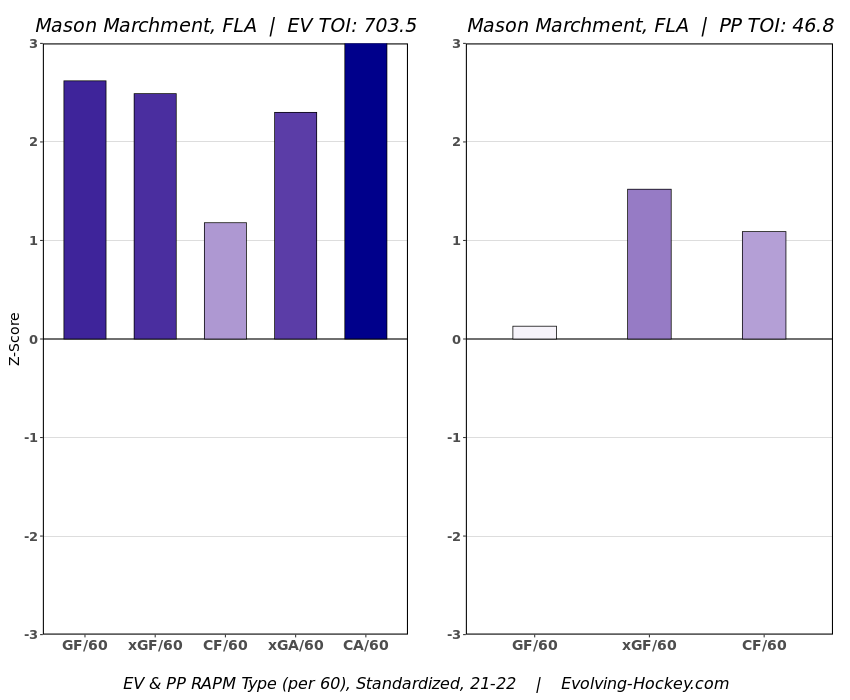
By his play-driving numbers from the same site, he had among the highest impacts (again, both for and against) in the league. Like, top-5 alongside names like Matthew Tkachuk and Patrice Bergeron. In order to visualize just how much Marchment meant to that third line, here is HockeyViz's expected goals for with the pending UFA and the rookie centre on the ice:
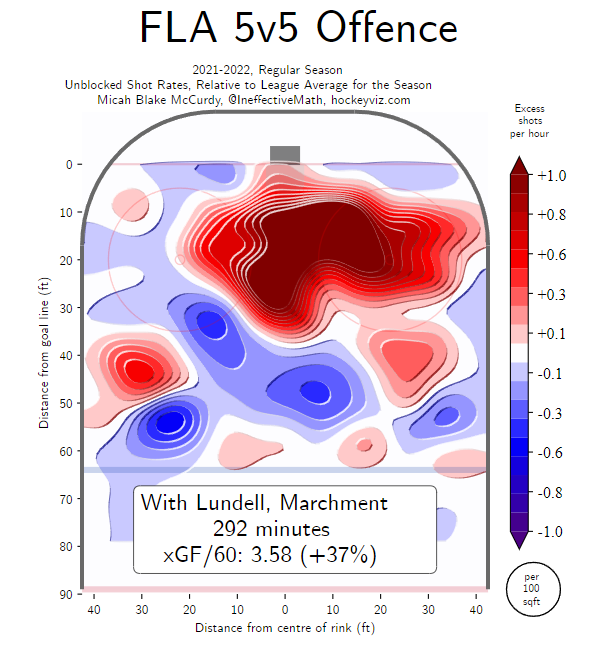
Red are areas where they generated more shots than the league average, and the darker the red, the higher the shot total. That is truly exceptional offensively. However, here is what it looks like when Lundell did not have Marchment beside him:
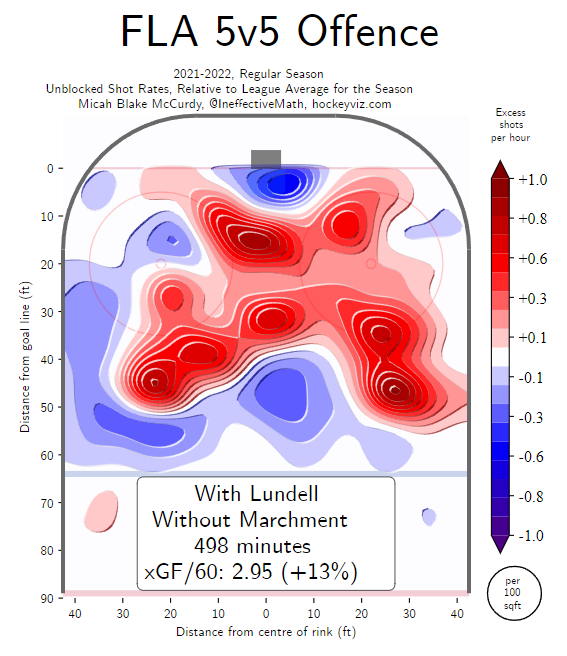
To be clear: this is still very good, but there's a chasm between "very good" and "this is basically what Johnny Gaudreau's on-ice shot profile in 2021-22 looks like."
This is the part where we need to be skeptical. On top of that secondary assist rate that will regress, there where other metrics (tracked by Corey Sznajder) like shot assists (passes leading to shots) and zone entry via passing that were below average in 2021-22. We should have some skepticism as to just how good of a playmaker he is, and whether he can support good assist totals in a full season. (As an aside: the metrics looked much better in his 33-game stint the season before, so let's not reach conclusions. There is still so much unknown here with an older player with no track record at the NHL level).
That last part is where I'll end on Marchment. There is a lot of unknown here. Is he the next Valeri Nichushkin, or is he the next Jordan Martinook? Both guys have had elite play driving seasons in the last five years, but only one turned into a good-to-great fantasy asset (there are also Martinook's injuries to consider). That makes 2022-23 very interesting.
The other guy worth a brief discussion is Sam Bennett. He had a very good fantasy year with 28 goals and 49 points in 71 games, posting 119 hits and 3.4 shots per night. His defence was a bit suspect, but his line was rarely used in a defensive role, so he doesn't really need to be elite defensively for them. He was still a good offensive play-driver, though:
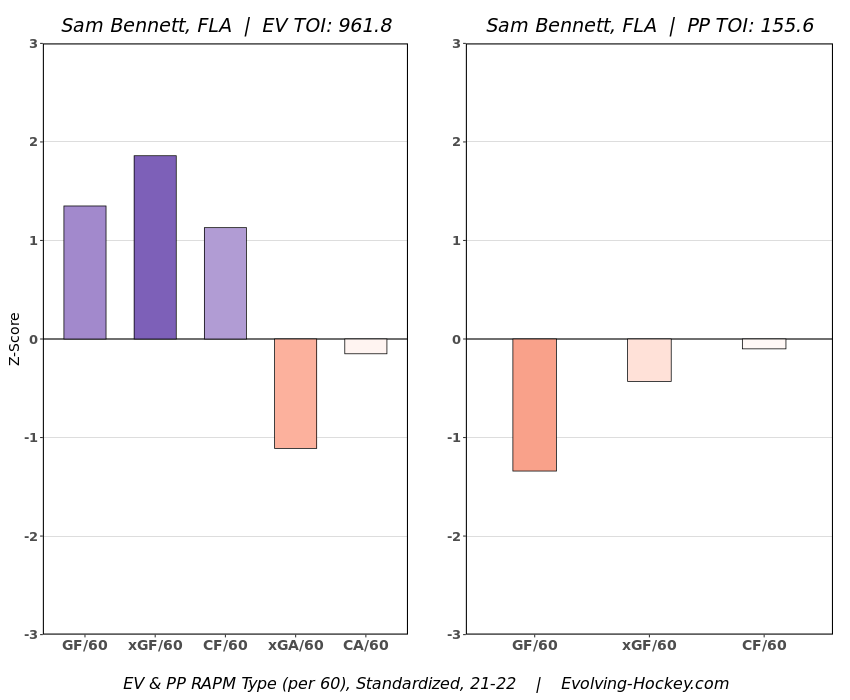
He and Huberdeau were very good in the opponent's end, and it was regardless of having Duclair, or Reinhart, or Owen Tippett (though that was the worst iteration). Bennett may not be a great playmaker, but he's good in transition, great off the rush, and he has a world-class playmaker next to him. There shouldn't be much concern about Bennett having a 25-goal season again, with great peripherals, provided he can play closer to 80 games in 2022-23.
With the usuals of Barkov, Huberdeau, Reinhart, Verhaeghe, Duclair, Ekblad, Weegar, and Forsling likely all returning, and both Bennett and Lundell appearing to be very viable second- and third-line centres for this team, there shouldn't be much downturn next year. The one guy to really be concerned about, from a fantasy perspective, is probably Lundell. He is unlikely to earn top PP minutes all year, and though I do think he'll be a top-line centre in a few years, being on the third line will keep him away from most of the top players. A line of Mamin-Lundell-Reinhart is probably a very good third line, but is it good enough to push for 60 points, as he may have done this year had he played 80-82 games? It's a tough ask, even in a high-scoring environment both on the team and league-wide level.
We still have to see what the team does this summer with a couple of those key returnees, but the vast majority of returnees should be just fine fantasy-wise. It's just once we get past their top-7 or top-8 scoring options (up front and on the blue line) that things get murky.


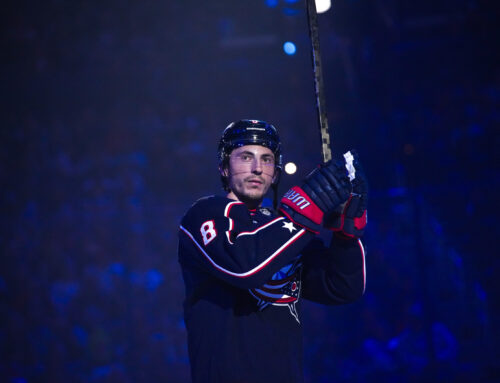
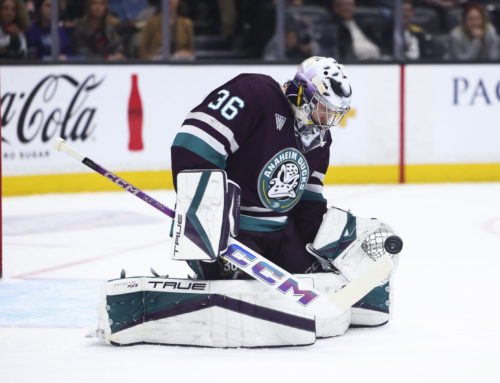

 EDM
EDM FLA
FLA NYR
NYR ANA
ANA MIN
MIN MTL
MTL DET
DET CAR
CAR CHI
CHI
